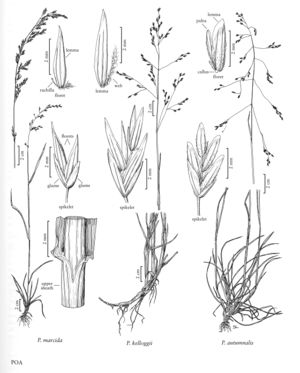Difference between revisions of "Poa autumnalis"
FNA>Volume Importer |
imported>Volume Importer |
||
| (6 intermediate revisions by 2 users not shown) | |||
| Line 4: | Line 4: | ||
|publications= | |publications= | ||
|common_names=Autumn bluegrass | |common_names=Autumn bluegrass | ||
| + | |special_status={{Treatment/ID/Special_status | ||
| + | |code=E | ||
| + | |label=Endemic | ||
| + | }} | ||
|basionyms= | |basionyms= | ||
|synonyms= | |synonyms= | ||
| Line 16: | Line 20: | ||
-->{{Treatment/Body | -->{{Treatment/Body | ||
| − | |distribution=Md.;N.J.;Okla.;Miss.;Tex.;La.;Pa.;Del.;Mich.;Ala.;D.C;Tenn.;N.C.;S.C.;Va.;Ark.;Greenland;Nunavut;Que.;Ill.;Ga.;Ind.;Ky.;Fla. | + | |distribution=Md.;N.J.;Okla.;Miss.;Tex.;La.;Pa.;Del.;Mich.;Ala.;D.C.;Tenn.;N.C.;S.C.;Va.;Ark.;Greenland;Nunavut;Que.;Ill.;Ga.;Ind.;Ky.;Fla. |
|discussion=<p><i>Poa autumnalis</i> grows primarily in the southeastern United States, being found in forests of the eastern and western Appalachian piedmont and coastal plain. It is readily distinguished from other perennial species of the eastern United States by its combination of glabrous calluses and pubescent palea keels.</p> | |discussion=<p><i>Poa autumnalis</i> grows primarily in the southeastern United States, being found in forests of the eastern and western Appalachian piedmont and coastal plain. It is readily distinguished from other perennial species of the eastern United States by its combination of glabrous calluses and pubescent palea keels.</p> | ||
|tables= | |tables= | ||
| Line 26: | Line 30: | ||
-->{{#Taxon: | -->{{#Taxon: | ||
name=Poa autumnalis | name=Poa autumnalis | ||
| − | |||
|authority=Muhl. ex Elliott | |authority=Muhl. ex Elliott | ||
|rank=species | |rank=species | ||
| Line 33: | Line 36: | ||
|basionyms= | |basionyms= | ||
|family=Poaceae | |family=Poaceae | ||
| − | |distribution=Md.;N.J.;Okla.;Miss.;Tex.;La.;Pa.;Del.;Mich.;Ala.;D.C;Tenn.;N.C.;S.C.;Va.;Ark.;Greenland;Nunavut;Que.;Ill.;Ga.;Ind.;Ky.;Fla. | + | |illustrator=Sandy Long |
| + | |illustration copyright=Utah State University | ||
| + | |distribution=Md.;N.J.;Okla.;Miss.;Tex.;La.;Pa.;Del.;Mich.;Ala.;D.C.;Tenn.;N.C.;S.C.;Va.;Ark.;Greenland;Nunavut;Que.;Ill.;Ga.;Ind.;Ky.;Fla. | ||
|reference=None | |reference=None | ||
|publication title= | |publication title= | ||
|publication year= | |publication year= | ||
| − | |special status= | + | |special status=Endemic |
| − | |source xml=https:// | + | |source xml=https://bitbucket.org/aafc-mbb/fna-data-curation/src/200273ad09963decb8fc72550212de541d86569d/coarse_grained_fna_xml/V24/V24_716.xml |
|subfamily=Poaceae subfam. Pooideae | |subfamily=Poaceae subfam. Pooideae | ||
|tribe=Poaceae tribe Poeae | |tribe=Poaceae tribe Poeae | ||
Latest revision as of 16:25, 11 May 2021
Plants perennial; not rhizomatous, not stoloniferous, loosely tufted. Basal branching mainly pseudointravaginal. Culms 23-86 cm tall, 0.8-1.8 mm thick, bases often decumbent. Sheaths closed for 1/3 – 1/2 their length; ligules 0.2-1.9(2.5) mm, smooth or obtuse; blades (0.5)1-4 mm wide, flat or folded, thin. Panicles (5)8-20 cm, erect or lax, broadly pyramidal at maturity, open, sparse, lower axils sometimes sparsely pubescent; nodes with 1-2(4) branches; branches 5-12 cm, spreading to reflexed, straight, angled, angles scabrous, with 3-8 spikelets in the distal 1/4-1/3. Spikelets 3-8.2 mm, laterally compressed; florets 2-4(6); rachilla internodes smooth, sparsely softly puberulent. Glumes distinctly shorter than the adjacent lemmas, distinctly keeled, keels scabrous; lower glumes subulate to lanceolate, (1)3-veined; upper glumes lanceolate to broadly lanceolate; calluses usually glabrous, rarely sparsely and shortly webbed; lemmas (2.8)3-4.6 mm, lanceolate, distinctly keeled, keels and marginal veins short- to long-villous, hairs extending up 3/4 of the keel, lateral veins prominent, intercostal regions softly puberulent, smooth, apices obtuse, blunt; palea keels softly puberulent to short-villous for much of their length, apices scabrous; anthers 1-1.4(2.6) mm. 2n = 28.
Distribution
Md., N.J., Okla., Miss., Tex., La., Pa., Del., Mich., Ala., D.C., Tenn., N.C., S.C., Va., Ark., Greenland, Nunavut, Que., Ill., Ga., Ind., Ky., Fla.
Discussion
Poa autumnalis grows primarily in the southeastern United States, being found in forests of the eastern and western Appalachian piedmont and coastal plain. It is readily distinguished from other perennial species of the eastern United States by its combination of glabrous calluses and pubescent palea keels.
Selected References
None.
